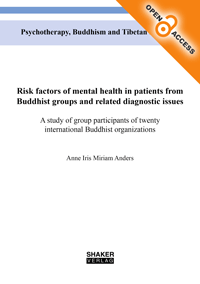
Shop : Details
Shop
Details

March 2022
eBook (PDF)
Anne Iris Miriam Anders
Risk factors of mental health in patients from Buddhist groups and related diagnostic issues
A study of group participants of twenty international Buddhist organizations
The acute and chronic mental diseases of participants in international Buddhist organizations currently present diagnostic, clinical, and psychotherapeutic challenges. A survey was therefore conducted to assess the harm to mental health that occurs against a background of structural violence, economic, emotional, or physical abuse, and cross-group damaging factors of internalized neologisms, e.g., rationalization of harm with ‘karma-purification’, in group members. It includes information on 22 persons from 20 different organizations, 60% of which had left their group.
Methodologically, questionnaires were designed for the particular context where quantification was partly supported by narratives.
The results show acute and chronic mental diseases across the groups as well as mental breakdowns and suicides. The most frequent diagnoses were depression, post-traumatic stress disorder, and anxiety disorder. 59,09% of the subjects had been in psycho-therapeutic treatment in the past, and 36,36% were currently in psychotherapeutic treatment. Social isolation, a known crucial factor of worsening mental health, was confirmed by 46,67% of the subjects based on their own experiences and by 20% due to witnessing others’ experiences. 40% affirmed that it was assumed in their groups that one or more persons could ‘purify’ someone else through ‘karma-purification’. 40% of the subjects affirmed having experienced violence towards themselves in their Buddhist group, 66,66% of which confirmed justification of violence by religion, and 33,33% reported having been slandered as crazy by nonprofessionals in their group. 33,33% testified to having been abused themselves, the same percentage attested the abuse of others and admitted to having tolerated abuse, and 26,66% confirmed their direct or indirect involvement in abuse. Whereas 33,33% affirmed that actions against themselves had been declared secret, 40% affirmed the same for others, and 26% confirmed that the latter was due to sexual abuse. Furthermore, 35,71% of the respondents agreed having been given wrong promises and 57,14% confirmed having been deceived by their Buddhist teachers, a serious breach of trust that will affect their treatment and spirituality as well. As much of damage seems to be well caused by structural issues in groups and by unreflectedly obeying any orders from above, people were also asked on their self-reflection concerning receiving commands and obedience when hearing someone ought to be punished or avoided, which allows to infer on their self-responsibility.
Methodologically, questionnaires were designed for the particular context where quantification was partly supported by narratives.
The results show acute and chronic mental diseases across the groups as well as mental breakdowns and suicides. The most frequent diagnoses were depression, post-traumatic stress disorder, and anxiety disorder. 59,09% of the subjects had been in psycho-therapeutic treatment in the past, and 36,36% were currently in psychotherapeutic treatment. Social isolation, a known crucial factor of worsening mental health, was confirmed by 46,67% of the subjects based on their own experiences and by 20% due to witnessing others’ experiences. 40% affirmed that it was assumed in their groups that one or more persons could ‘purify’ someone else through ‘karma-purification’. 40% of the subjects affirmed having experienced violence towards themselves in their Buddhist group, 66,66% of which confirmed justification of violence by religion, and 33,33% reported having been slandered as crazy by nonprofessionals in their group. 33,33% testified to having been abused themselves, the same percentage attested the abuse of others and admitted to having tolerated abuse, and 26,66% confirmed their direct or indirect involvement in abuse. Whereas 33,33% affirmed that actions against themselves had been declared secret, 40% affirmed the same for others, and 26% confirmed that the latter was due to sexual abuse. Furthermore, 35,71% of the respondents agreed having been given wrong promises and 57,14% confirmed having been deceived by their Buddhist teachers, a serious breach of trust that will affect their treatment and spirituality as well. As much of damage seems to be well caused by structural issues in groups and by unreflectedly obeying any orders from above, people were also asked on their self-reflection concerning receiving commands and obedience when hearing someone ought to be punished or avoided, which allows to infer on their self-responsibility.
Other formats
Print version: 978-3-8440-8450-4
DOI 10.2370/9783844084993
You need Adobe Reader to view these files. Here you will find a little help and information for downloading the PDF files.
| Document |  | Open-Access-Document | ||
| Type |  | |||
| Costs |  | free | ||
| Action |  | Download the file | ||
User settings for registered online customers (online documents)
You can change your address details here and access documents you have already ordered.
User
Not logged in
Shaker Verlag GmbH
Am Langen Graben 15a
52353 Düren
Germany
Am Langen Graben 15a
52353 Düren
Germany
Mon. - Thurs. 8:00 a.m. to 4:00 p.m.
Fri. 8:00 a.m. to 3:00 p.m.
Fri. 8:00 a.m. to 3:00 p.m.
Contact us. We will be happy to help you.

